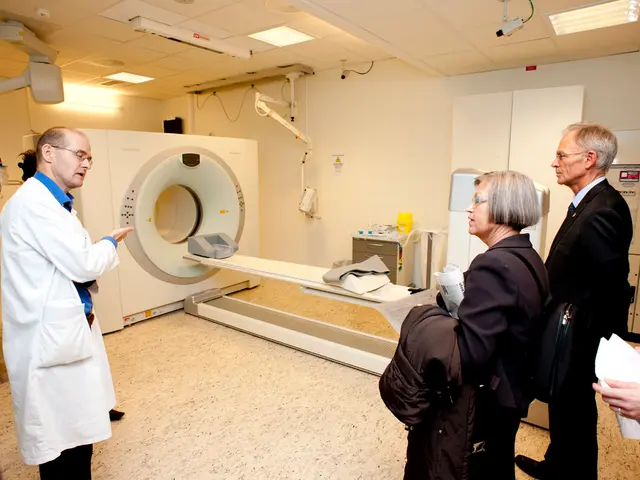USAID funding reductions jeopardize the health and lives of HIV-affected children, as stated by humanitarian workers.
Rolling Dice with Lives: The Plight of HIV-Positive Children Amidst Ongoing Aid Cuts
In a hillside village on the outskirts of Kampala, Uganda, approximately 200 children call home. These children, taken under the wing of the Light the Future Foundation, find solace, education, and survival. The organization, founded by none other than Patrick Ssenyondo, aims to provide critical care for HIV-positive children who have been abandoned in the east African nation.
Most of these children have lost their parents, and those who haven't are often unable to care for them due to financial constraints. Ssenyondo explains, "They can't pay their tuition, they cannot pay for their medication, they can't pay for food."
But these children are confronting a grim new threat to their survival. On January 20, President Donald Trump imposed an executive order that temporarily halted foreign aid for 90 days. This decision led to the termination of several foreign aid contracts, causing disarray among facilities like the Light the Future Foundation.
Ssenyondo shares that the foundation once held a month's supply of medication before the budget cuts. Now, he's been forced to ration, managing only a week's worth of medication since the cuts. Though no child has yet perished at his center, one of the teachers, a 28-year-old named Mary, succumbed to the consequences. Ssenyondo implies her death was a result of the cuts to foreign aid.
To the east of the city, Bayo Emmanuel, founder of the Bright Star Orphanage, experiences a similar story. Previously, the eight HIV-positive orphans under his care received their medication for free. However, after the aid cuts, Emmanuel was told to turn to the private sector. Struggling to pay for all the children's medication, the orphanage ran out. One of the children, a 14-year-old named Migande Andrew, quickly fell ill and passed away.
Uganda records one of the highest rates of HIV in the world. With an estimated 53,000 HIV-related deaths worldwide attributable to the US Aid cuts, Andrew and Mary are not unique cases[1][2]. The PEPFAR Impact Tracker, a tool tracking the influence of the President's Emergency Plan for Aids Relief, projects more than 9,000 children's lives could be lost globally by 2025 if services are not reinstated[1].
This year, the Trump administration announced it would be terminating 90% of its foreign aid contracts and cutting $60 billion in funding for international programs[3]. The administration denies responsibility for any fatalities in connection to the recent cuts. Secretary of State Marco Rubio addressed the cuts during a press conference, stating, "We've issued waivers because we don't want to see anybody die or anybody be harmed in the short term. But we're going to conduct a review, and we are going to have foreign aid in this country that is going to further the national interests of the United States."
Yet, people in Uganda are battling hard to maintain their communities' survival. In western Kampala, a clinic called The Family Hope Center is persisting due to the staff's determination and resilience. Since March, all staff have been working for free. The center, which has been offering comprehensive HIV care and treatment since 2005, is a beacon of hope for nearly 4,000 patients[1]. Now, these patients are uncertain about the center's future funding.
At the orphanage, Ssenyondo ponders what the future holds. "This is the time when the children need us more," he says. "This is the time when we have to act so much to encourage these children not to lose efforts to fight AIDS."
References:[1] Boston University's PEPFAR Impact Tracker, https://bupafarimpact.org/[2] The Guardian, https://www.theguardian.com/global-development/2020/may/23/donald-trumps-hiv-cuts-in-uganda-threaten-health-and-lives[3] Reuters, https://www.reuters.com/article/us-usa-foreignaid-budget-idUSKBN2BW2AD
- Despite the challenges faced by organizations like the Light the Future Foundation and Bright Star Orphanage due to policy-and-legislation changes, such as the aid cuts, the staff at a clinic called The Family Hope Center in western Kampala remain determined to continue providing healthcare for nearly 4,000 HIV patients.
- In the realm of international politics, the Trump administration announced plans to terminate 90% of its foreign aid contracts and cut $60 billion in funding for international programs, which has raised concerns within the field of general-news about the potential impact on worldwide health-and-wellness, particularly in countries with high HIV rates like Uganda.
- Among various sectors affected by the aid cuts, education is a significant concern for organizations like the Light the Future Foundation, as they struggle to afford tuition, medication, and food for the hundreds of HIV-positive children in their care.
- The ongoing situation regarding the aid cuts has resulted in a rationing of medication for HIV-positive children in various orphanages, increasing the pressure on mental-health support services to help these children deal with the uncertainty and fear surrounding their future.
- In the midst of this crisis, theLight the Future Foundation's founder, Patrick Ssenyondo, advocates for maintaining efforts to combat AIDS, emphasizing the importance of providing assistance and encouragement to HIV-positive children so they do not lose hope during these challenging times.







